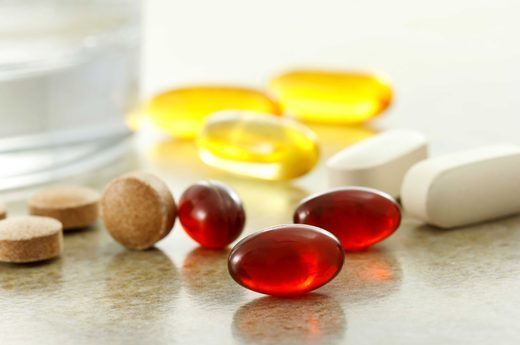These 7 popular supplements are so common that no one would suspect them of being little more than cleverly marketed placebos.
Here are 7 supplements that probably aren’t worth all the hype or the cash:
1. Fat Burning Supplements
The human body is a finely tuned machine, having developed the ability to store extra calories as adipose tissue (fat) for times when food is scarce. Metabolism and fat burn are controlled within fairly tight parameters. So it’s no wonder that few legal options exist to burn any substantial amount of body fat.
Even the handful of mildly effective fat burners (such as caffeine) lead to much less weight loss than eating a bit less each day, or taking a daily walk. Fat burners are also fairly likely to have side effects such as sleep disruption (which can mean higher stress and overeating … making you even heavier!) and cardiovascular effects.
Bottom line: most fat burners are a kitchen sink equation, full of things that have little proof they work (and may actually set you back by messing up your sleep).
2. Calcium
Don’t mistake supplements that don’t work for nutrients you don’t need. Calcium is an important mineral for bone health, but supplementing it is usually a waste of money. Calcium is found naturally in dairy products, including protein supplements. Just one serving of casein protein provides 60% of the recommended daily allowance (RDA) of calcium!
Supplementing calcium by itself does not substantially improve bone density. You have to take it with other nutrients like vitamin D, vitamin K, and magnesium to benefit bone health. The combination of all these form a stack, which is when supplements work together towards a common goal (don’t worry, I’ll be discuss stacking in the future).
Bottom line: Calcium deficiencies are rare, and can be easily fixed by slightly modifying your diet. Calcium supplementation is largely unnecessary.
3. CoQ10
Coenzyme Q10 (CoQ10) is a molecule made by the cells to help the body produce energy. It is a very popular supplement because it’s marketed as an antioxidant, is supposed to be heart-healthy, and is claimed to have ‘bioenergetic health effects.’
CoQ10 is a very important molecule for people that have suffered a heart attack, since CoQ10 supplementation can reduce the risk of a second heart attack. It also may be useful for those on statin therapy, because certain side effects may be caused by statins reducing CoQ10 levels. CoQ10 may have an antioxidant effect, but evidence suggests it is quite weak. Recent evidence has linked CoQ10 to possible improvements in chronic fatigue syndrome, but CoQ10 has also been marketed for a very wide variety of largely unsupported benefits.
Bottom line: If you’re not taking statins or haven’t suffered a heart attack, or don’t have increased risk for heart disease, don’t feel the need to take CoQ10 supplementation for antioxidant or general health benefits.
4. Testosterone boosters
Correcting low testosterone can be a life changer — sudden gains at the gym, improved mood, once again feeling randy in the bedroom. But T-boosting supplements simply do not deliver on their promises, especially for those with normal testosterone levels looking to get a big boost.
The problem is that supplement companies aren’t outlawed from cherry picking rat study results to fool you into thinking there’s good evidence for their T-boosters. Some T-boosters can in fact increase libido, but have no effect on your actual testosterone levels. So you may feel like something is happening, but they’re not actually increasing your testosterone levels.
Even the rare supplement that has an effect on testosterone will have very minor effects. Prescription testosterone products from a physician can double or triple testosterone, while an effective supplement might increase T by 30% or so.
Bottom line: To maintain healthy testosterone levels, stick to what’s shown to work: steady doses of sleep and weight-lifting, and enough food and fat to support hormone levels.
5. Glutamine
Glutamine is an essential amino acid that plays a variety of roles in the body. It’s found in muscle tissue, so meat products have high levels of glutamine. Adding glutamine to a muscle cell causes the cell to grow.
Unfortunately, supplementing glutamine doesn’t work for building muscle. The glutamine never makes it to the muscles because the intestines absorb the glutamine and only release a bit to the muscles (and only as you need them). So even if you supplement a lot, the intestines end up hoarding it for themselves!
So supplementing glutamine for muscle gains does not work. Supplementing glutamine IS good for gut health!
Bottom line: If your goal is to improve gut health, just supplement whey protein. It has high glutamine levels and is cheaper than just buying glutamine itself.
6. BCAAs
Branched chain amino acids (BCAAs) are three amino acids that marketers claim improve muscular endurance and growth. The main amino acid is called leucine. There is evidence that suggests supplementing leucine in a fasted state (meaning you haven’t eaten) can improve muscle protein synthesis, which is part of the process of building muscle.
Bottom line: People interested in building muscle will experience more benefits from eating a high protein meal instead of supplementing leucine. Protein contains BCAAs anyway, so unless you are specifically training fasted, whey protein is a far more effective supplement than BCAAs.
7. Carbohydrate Supplementation
Supplement stores are filled with fancy carbohydrate supplements promising enhanced glycogen replenishment. It is marketed that faster glycogen replenishment means better muscular performance … except that most studies don’t find much benefit from glycogen replenishment supplements.
Bottom line: Rest days should be a part of any workout program because glycogen will naturally replenish during rest. Unless you’re an extreme endurance athlete who prefers gel carbohydrate supplements to liquids, a simple sports drink will render a fancy carbohydrate supplement unnecessary.




